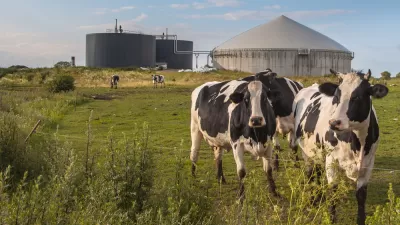Yes, one is with and the other without oxygen, and both divert waste from the landfill—but in terms of the end products, what is the advantage of anaerobic digestion? Simply put, does society face a shortage of compost or renewable energy?
In San Francisco, the green compost bins are ubiquitous. Even the food trucks are required to place bins alongside their trucks for compost, recyclables, and trash. Result: the city is diverting an enormous amount of trash from the landfill to help meet its zero-waste goal and producing lots of compost in the process - a process which also produces a lot of carbon dioxide, "the primary greenhouse gas emitted through human activities," according to the EPA.
A few cities are taking an alternative, more expensive approach to diverting this organic waste called anaerobic digestion and in the process also producing biomethane that is captured for use in electricity generation or used as a transporation fuel. And from a "carbon intensity" perspective, this biogas, also called renewable natural gas, scores at the bottom of carbon intensity chart [PDF, pg. 49] for California's Low Carbon Fuel Standard, i.e. it is one of the cleanest of all transportation fuels.
But this story is not about San Francisco's compost bins nor about the California's Low Carbon Fuel Standard. It is about Brooklyn's Newtown Creek Wastewater Treatment Plant and its anaerobic digestion done by bacteria in "eight huge, shiny, oval-shaped steel tanks known as digester eggs," writes (and states) Joel Rose [listen here].
"Right now, what these bacteria are digesting is mostly sewage sludge. But they're being introduced to a new diet: food scraps. The hope is that this plant will soon take in hundreds of tons of organic waste from houses and apartments.
A bold plan - but one with huge greenhouse gas emission reduction payoffs as food-waste is one of the world's largest sources of emissions as we noted last year.
Anaerobic digestion is more popular in Europe and in a few cities in Canada and California, including San Jose and Los Angeles. While there clearly is a need for more renewable energy, be it in the form of electricity generation or transportation fuels, it is uncertain whether anaerobic digestion will take hold in the U.S. as widespread as composting.
"Right now, it's all in its infancy," says Samantha MacBride, a former New York sanitation official who's now a professor at the City University of New York's Baruch College. "And it's a huge question mark about whether it can grow."
FULL STORY: Turning Food Waste Into Fuel Takes Gumption And Trillions Of Bacteria

Maui's Vacation Rental Debate Turns Ugly
Verbal attacks, misinformation campaigns and fistfights plague a high-stakes debate to convert thousands of vacation rentals into long-term housing.

Planetizen Federal Action Tracker
A weekly monitor of how Trump’s orders and actions are impacting planners and planning in America.

In Urban Planning, AI Prompting Could be the New Design Thinking
Creativity has long been key to great urban design. What if we see AI as our new creative partner?

King County Supportive Housing Program Offers Hope for Unhoused Residents
The county is taking a ‘Housing First’ approach that prioritizes getting people into housing, then offering wraparound supportive services.

Researchers Use AI to Get Clearer Picture of US Housing
Analysts are using artificial intelligence to supercharge their research by allowing them to comb through data faster. Though these AI tools can be error prone, they save time and housing researchers are optimistic about the future.

Making Shared Micromobility More Inclusive
Cities and shared mobility system operators can do more to include people with disabilities in planning and operations, per a new report.
Urban Design for Planners 1: Software Tools
This six-course series explores essential urban design concepts using open source software and equips planners with the tools they need to participate fully in the urban design process.
Planning for Universal Design
Learn the tools for implementing Universal Design in planning regulations.
planning NEXT
Appalachian Highlands Housing Partners
Mpact (founded as Rail~Volution)
City of Camden Redevelopment Agency
City of Astoria
City of Portland
City of Laramie



























